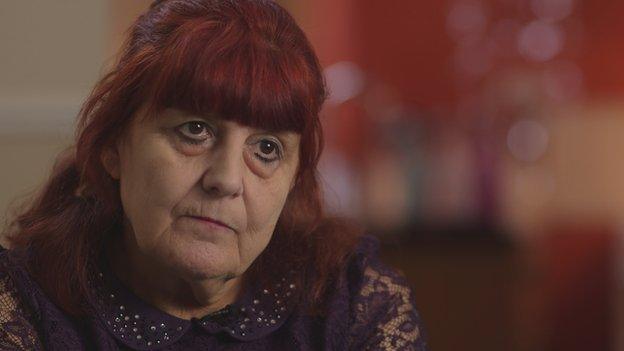New domestic abuse law on controlling behaviour unveiled
- Published
Domestic abuse victim Laura Lyons: "He threw me down three flights of stairs"
A new domestic abuse offence for "coercive and controlling behaviour" within relationships has been announced by the home secretary.
Theresa May said domestic abuse by intimate partners or family members was a "hideous" crime that shattered lives.
She said she hoped the new law would protect victims from extreme psychological and emotional abuse.
The maximum penalty for the new offence in England and Wales will be five years in prison and a fine.
Coercive and controlling behaviour can include the abuser preventing their victim from having friendships or hobbies, refusing them access to money and determining many aspects of their everyday life, such as when they are allowed to eat, sleep and go to the toilet.
Witness testimony could be supported at prosecution through a variety of ways, including documentary evidence of threatening emails and text messages, or bank statements that show the perpetrator sought to control the victim financially.
'Break free safely'
The new offence, external comes after the government ran a consultation over the summer seeking views on whether the law on domestic abuse needed to be strengthened.
The Home Office said that 85% of the participants in that consultation said the law did not provide sufficient protection to victims.
Mrs May said: "Coercive control can be tantamount to torture. In many cases, dominance over the victim develops and escalates over the years until the perpetrator has complete control. Putting a foot wrong can result in violent outbursts, with victims living in fear for their lives."
Polly Neate, chief executive of Women's Aid, said: "We hope this new law will lead to a real culture change, so that every woman experiencing control can get the support she needs to break free safely."
Not the right solution
But Sandra Horley, chief executive of national domestic violence charity Refuge, said creating a new offence was not the answer because there were "already enough laws", but they were "not being implemented correctly".
There are a number of laws that already cover acts of violence, stalking and harassment - but none of them refer in their wording to personal relationships or the precise terms of the official definition of domestic abuse.
Gillian Guy, the chief executive Citizen's Advice, said by introducing the new offence, the government was sending a clear message that domestic abuse in all forms will not be tolerated.
Earlier in the year, a report criticised, external police forces in England and Wales for failing to deal with domestic abuse adequately.
It found only eight out of 43 forces were dealing well with the issue.
The Scottish government announced last month it will consult on whether to introduce more offences to strengthen its domestic abuse law in the new year.
- Published20 August 2014
- Published8 December 2014
